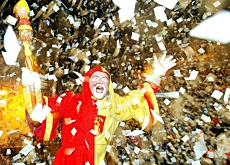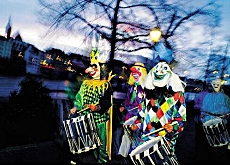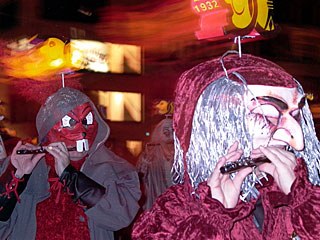Carnival fever bewitches Swiss fools

Revellers were out in force in Switzerland's traditionally Catholic regions for the start of the country's carnival season.
In the city of Lucerne on Thursday the crowds flocked to hear the “Big Bang”, a pre-dawn gun salute, and to the traditional procession.
Dead on 5am, dozens of costumed brass bands in Lucerne took their signal from the Big Bang and struck the first chords of marches and other discordant tunes, known as “Guggenmusik”.
Later in the day about 18,000 people watched the traditional afternoon procession through the streets of the city centre on “Dirty Thursday”.
Another pageant is scheduled for Carnival Monday.
As custom dictates the master of the “Saffron” guild – dressed up in the robes of Father Fritschi, a 17th-century figure – took over the reign for the next few days.
Ancient guilds dating back to the Middle Ages play a central role in Lucerne’s carnival which has a reputation of being more spontaneous than others.
The festivities which are due to last until March 1, Ash Wednesday, are expected to attract tens of thousands of revellers to one of Switzerland’s major carnival events.
Upside down
Crowds of people in colourful costumes as well as music bands also joined the local carnivals in the eastern city of St Gallen.
In the town of Solothurn, the revellers set off for a traditional “Morning Promenade” through the alleys of the old town. It was led, as always, by the head of the Honolulu Guild.
During carnival, when everything is “upside down”, Solothurn changes into Honolulu – ever since someone claimed that the town was exactly on the other side of the world from the Hawaiian capital.
Another highlight of Switzerland’s carnival season will not get underway until March 6 when thousands of revellers in the city of Basel take to the streets for what many describe as the “most beautiful days of the year”.
Festivities in other predominantly Protestant regions, including the capital, Bern, get underway next week.
swissinfo with agencies
Carnival traditionally lasts from “Dirty Thursday” to Ash Wednesday, the start of Lent.
Lent is the Christian fast lasting 40 days from Ash Wednesday to Easter.
Basel’s carnival breaks with tradition by beginning on the Monday following Ash Wednesday – this year on March 6.
Carnival is a chance for the Swiss, sticklers for discipline and decorum for the other 51 weeks of the year, to let their hair down and release pent-up emotions.
The best-known Swiss carnivals are held in Basel and Lucerne.
Black humour has been part of carnival since the Middle Ages when the lower classes seized the opportunity to mock their rulers from the safety of their disguises.
The authorities in many Swiss towns tried to ban the wearing of costumes and on at least three occasions carnival led to open rebellion.

In compliance with the JTI standards
More: SWI swissinfo.ch certified by the Journalism Trust Initiative


You can find an overview of ongoing debates with our journalists here. Please join us!
If you want to start a conversation about a topic raised in this article or want to report factual errors, email us at english@swissinfo.ch.